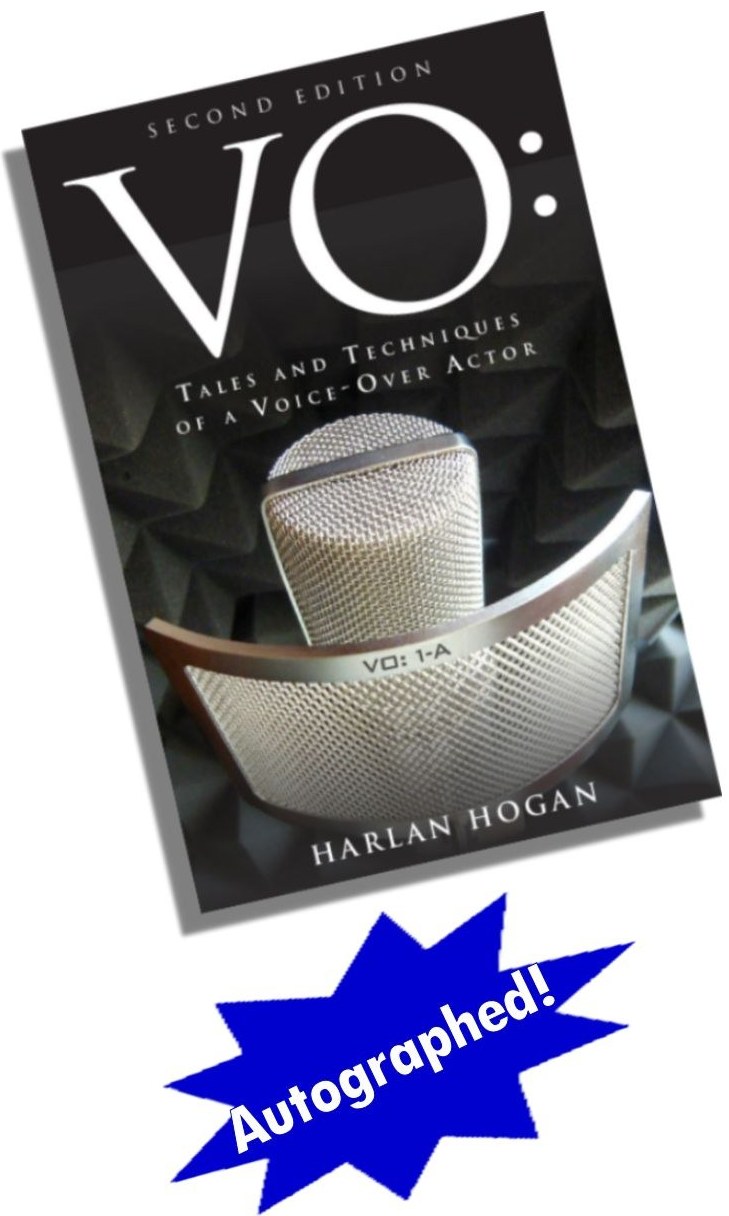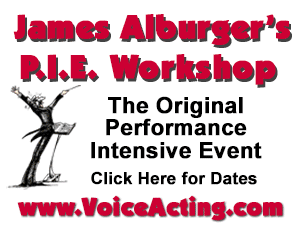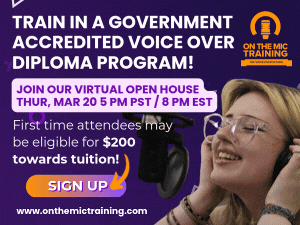|
'VO: TALES AND TECHNIQUES' - Part 3 VO Storytelling, A Key Career Lesson, & Marketing: Q&A With Harlan Hogan October 20, 2014 Part 3 of 3 / See Part 1 / See Part 2  By John Florian By John FlorianVoiceOverXtra In recent days we've published excerpts from the second edition of legendary voice actor Harlan Hogan's popular new book, VO: Tales and Techniques of a Voice-Over Actor - a 200-plus page collection of humorous and lesson-filled stories and advice on voice acting, home audio studios, business and marketing. Today, in the final part of our series, Harlan - or H2, as he often signs his name - answers our questions about storytelling, a key career lesson, and marketing. Note: Harlan has agreed to send an autographed copy of VO: Tales and Techniques of a Voice-Over Actor (second edition) to VoiceOverXtra readers who purchase the new book by clicking here (with free shipping in the 48-continguous U.S. states).Q: Harlan, what characteristics, or attributes are common to a good storyteller Ė whether spinning oneís own yarn or reading one as a voice over?  H2: An innate or discovered understanding
of precisely WHAT the story is about in its simplest form. That leads to an organic and logical construction of the story and
achieves its specific goal (the WHAT), which might be to
entertain, educate, motivate etc. H2: An innate or discovered understanding
of precisely WHAT the story is about in its simplest form. That leads to an organic and logical construction of the story and
achieves its specific goal (the WHAT), which might be to
entertain, educate, motivate etc. Macbeth is not about Macbeth and his dastardly wife and the forest moving and blood that canít be washed away - itís about Ambition and Treachery. A commercial - on the surface - might appear to be about low, low monthly payments on a powerful luxury car, but at itís core, itís a tale of attaining a sense of self-fulfillment and accomplishment at an affordable price. Q: Is storytelling a skill we can learn, or must we be born with it? H2: There are born storytellers of course, but even they can stumble when the script is not their yarn but one written by someone else. Thatís the art and craft and magic of great voice over; defining, understanding and assimilating the words AND the INTENTION - the "what the story is aboutĒ - and making that story your own. Q: Youíve often said, "If I knew then what I know now Ö.Ē So, what is the key thing you would have done differently in your early voice over career? H2: Trust that my life and work experiences prior to becoming a full-time actor would prove valuable. Early-on I resented the time I spent failing as a computer salesman, regretted floundering as a mediocre advertising manager and being bored to death as a disc jockey. But those and other Ďfailuresí formed a solid foundation for my new career I just couldnít see it at the time. Iíve rarely met a person - and that includes me - who had been fired from one or more jobs who didnít say, "I got fired, but you know it turned out to be the best thing that ever happened!Ē Q: Many VOs fear marketing, hoping business will somehow otherwise come to them. But if we want to succeed, what percent of our work time and effort needs to go into self-promotion? And in your experience, whatís the most effective way to market? H2: In my experience, most voice over performers spend about 2% or their work time actually speaking into a microphone - yet they concentrate 98% of their thoughts on performance. Many times Iíve had a fellow actor saying to me something similar to this: "Iím an actor, Iím unique, Iím not a salesperson, I shouldnít have to promote - itís beneath my artistic sensibilities. Hey, Harlan did you notice how clearly and with what conviction I just said that?"I reply: "I did, and Iím glad to hear that. Means one less person I have to compete with."My response may sound a bit cruel, but so be it. That actor has a Ďhopeí career. They hope something will come along. They hope theyíll win that next audition. They hope the rules of the universe and commerce donít apply to them. Theyíd have better luck playing the Lottery. Iíve built a 35-year career by investing the bulk of my work time marketing. From direct mail, to asking for referrals, maximizing my rapport with my agents and clients to honest-to God good old-fashioned face-to-face sales calls. Marketing is not Ďbeneathí us. Itís the heart of any and every business endeavor. Thereís an old line that goes: "Talent isnít worth much without a place to use it.Ē Discovering the places to use your talent is simply another way to define marketing. There isnít a "most effective way to marketĒ - itís never that easy. There is a process to follow, however, that helps you determine what kind(s) of marketing youíll do. Like telling a good story, you start with the WHAT. What am I trying to accomplish?
By the way, never be afraid to ask for and pay for expert help. Just because we read a lot of commercials doesnít mean we can write them! ------------------------ ABOUT HARLAN Harlan Hogan has been a voice actor for 35 years, and odds are you already know what he sounds like. His commercial voice overs include classic and contemporary ad slogans from "Raid. Kills bugs fast, kills bugs dead" and Life Cereal's "It's the cereal even Mikey likes" to "This PBS program is made possible by viewers like you." Twenty-six million online gamers hear him as the voice of Alistar in League of Legends, while filmgoers see and hear him in the feature-length film Dimension. He's equally at home narrating documentaries, voicing commercials for political candidates and much more. Harlan also created Voice Over Essentials, an online voice over equipment boutique. Web: www.HarlanHogan.com Voice Over Essentials online store VO: Tales and Techniques of a Voice-Over Actor |
Inspiring interviews help your VO career
On Michael Langsner's Voice-Over Roadmap Podcast
With Sean Daeley and Paul Stefano - check it out!
For essential voice-over business strategies
As of the NEW website launch, 03/22/2012










I've taught a one day class in New York and Los Angeles on how to double your income as a VO, I enjoyed it but for all the good it did most of the people who attended I may as well have carved my initials on a passing Albanian Hooker.
Coming up - In LA or NYC. Learn the art of the "Iranian Double Pause" for only $295 including lunch. You'll love it, it's pointless.
Harlan will get you to do stuff and accept responsibility, you don't need that in your lives, unpaid bills are much more fun.
"He who lives on Hope, starves to death"